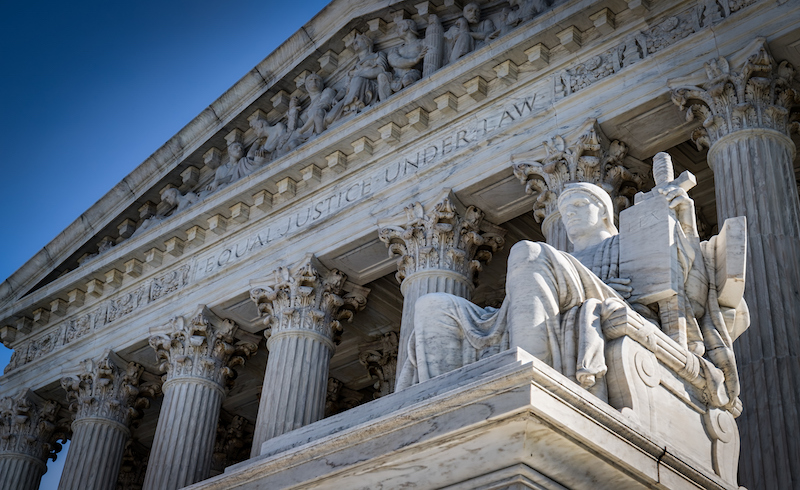
Scholars discuss some of the Court’s most significant regulatory decisions.
In its recently concluded term, the U.S. Supreme Court heard many cases involving questions of regulatory law and policy. With these cases based on issues as varied as energy and administrative law, as well as health care and antitrust enforcement, the 2020-2021 term will affect multiple facets of administrative and regulatory law.
In a number of key cases, the unanimity of otherwise ideologically split Justices surprised commentators. Although some court observers viewed the Court’s term overall as a quiet one, other observers noted that even some of the unanimous decisions were not quite as unanimous as they might have first appeared.
The Supreme Court’s 2020-2021 term was its second, and hopefully last, term conducted during the COVID-19 pandemic, and its first term with Justice Amy Coney Barrett on the bench. Through the cases highlighted in this series and others, it will leave an imprint on the future of regulatory law and policy in the United States.
The Regulatory Review has invited leading scholars to comment on the Court’s regulatory decisions from the recent term. Among the contributors to this series are: Bernard Bell, Rutgers Law School; Cary Coglianese, University of Pennsylvania Law School; Monika Ehrman, University of Oklahoma College of Law; Michael C. Harper, Boston University School of Law; Allison K. Hoffman, University of Pennsylvania Law School; Justin (Gus) Hurwitz, Nebraska College of Law; William Kovacic, George Washington University Law School; Gabriel Scheffler, University of Miami School of Law; Bijal Shah, Arizona State University Sandra Day O’Connor College of Law; Mila Sohoni, University of San Diego School of Law; and Daniel E. Walters, Penn State Law.
July 19, 2021 | Cary Coglianese, University of Pennsylvania Law School, Gabriel Scheffler, University of Miami School of Law, and Daniel E. Walters, Penn State Law
The recent Supreme Court term was exceptional in the sense that it involved key questions about the role of exceptions to otherwise applicable regulatory law. Recognizing the importance of such exceptions shows that this term takes on greater significance than it might at first appear.
Giving California v. Texas the Attention It Deserved
July 20, 2021 | Allison K. Hoffman, University of Pennsylvania Law School
California v. Texas, a case once again challenging the constitutionality of the Affordable Care Act, was nonsense from day one, and the Court’s perfunctory dismissal of the case on standing grounds was an appropriate response.
Returning to Agency Deference in Communications Law
July 21, 2021 | Justin (Gus) Hurwitz, Nebraska College of Law
The U.S. Supreme Court returns to agency deference in its Prometheus decision after the Federal Communications Commission’s protracted struggle to revise its media ownership rules.
Heavy on the “Mayo,” But No Hot Sauce
July 22, 2021 | Mila Sohoni, University of San Diego School of Law
CIC Services reaffirmed the breadth of core commitments to administrative law without any of the “anti-administrativist” rhetoric that has characterized other recent administrative law decisions.
Expanding Presidential Influence on Agency Adjudication
July 23, 2021 | Bijal Shah, Arizona State University Sandra Day O’Connor College of Law
The Supreme Court’s decision in U.S. v. Arthrex expands the avenues for politicizing agency adjudication.
AMG Aftershocks
July 26, 2021 | William Kovacic, George Washington University Law School
A recent Supreme Court decision disabled one of the U.S. Federal Trade Commission’s central enforcement tools for prosecuting fraud and antitrust violations.
The Appointment and Removal Litigation System
July 27, 2021 | Bernard Bell, Rutgers Law School
The Court’s decision in Collins v. Yellen further clarifies congressional power to remove executive officials “for cause.”
Applying the Takings Clause to Regulatory Access
July 28, 2021 | Michael C. Harper, Boston University School of Law
Cedar Point Nursery is the Court’s first application of the Takings Clause to require compensation from the government for regulatory access to private property. But the decision may have a limited impact .
Reexamining the Renewable Fuel Standard, Both Letter and Spirit
July 29, 2021 | Monika Ehrman, University of Oklahoma College of Law
In HollyFrontier the Supreme Court failed to address the purpose of EPA’s renewable fuel standard exemptions.
"term" - Google News
July 19, 2021 at 12:33PM
https://ift.tt/3BlVVNI
The Supreme Court's 2020-2021 Regulatory Term - The Regulatory Review
"term" - Google News
https://ift.tt/35lXs52
https://ift.tt/2L1ho5r
Bagikan Berita Ini

















0 Response to "The Supreme Court's 2020-2021 Regulatory Term - The Regulatory Review"
Post a Comment